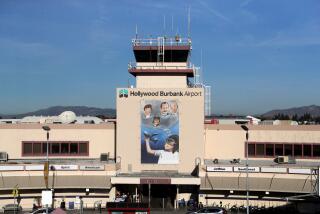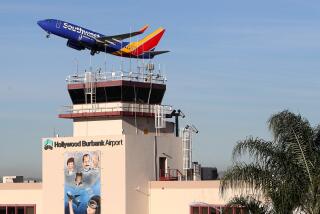FAA Chief Cites Flaws in Burbank Airport Plan
BURBANK — In a move officials said could set back the new Burbank Airport terminal project up to two years, FAA administrator Jane Garvey said the airport cannot unilaterally close the terminal building overnight without a full noise study.
In a March 24 letter to Burbank city officials, Garvey wrote that “active barring of use of the terminal would turn a voluntary curfew into a mandatory one and would be impermissible without first complying with applicable requirements of Part 161.”
Under the rules spelled out in the Airport Noise and Control Act of 1990, local airports cannot impose noise restrictions such as overnight curfews without first completing a so-called Part 161 noise study.
As a result of Garvey’s letter, Burbank city officials said they had no hope of enforcing a terminal closure or outright curfew without completing the noise study--which is expected to take two years. The proposed terminal closure from 11 p.m. to 6 a.m. was intended to skirt the need for a formal noise study that would be required under a curfew.
“The nighttime closure was designed to avoid the need for government approval,” said Peter Kirsch, special counsel for Burbank on airport issues. “The administrator’s letter makes clear that federal approval would be required for any restrictions along the lines of what the city wants, which will mean a delay of as long as two years before the old terminal can be replaced.”
Councilman Bob Kramer said city officials will not accept a new terminal without a prohibition on overnight airline flights. The airport now has a voluntary curfew from 10 p.m. to 7 a.m.
“Sooner or later we have to realize that Jane Garvey doesn’t care about the people of Burbank,” Kramer said. “Maybe she would be more cooperative if we said flat out, ‘She’s never going to see a new terminal until we see a curfew and a cap on flights.’ ”
Garvey’s letter came in response to Burbank Mayor Stacey Murphy’s call for the clarification of legal questions raised in connection with the terminal framework agreement signed last August by airport and city negotiators.
In addition to terminal closure, Garvey cast doubt on other provisions in the terminal framework including annual payments of $1.5 million in airport passenger taxes to Burbank in lieu of lost sales taxes and direct payment for such infrastructure improvements as new sewer lines and mass transit upgrades.
Garvey pointed to progress on other controversial aspects of the deal including a proposed ban on easterly takeoffs, which has been opposed by Los Angeles residents living south and west of the airport.
Nevertheless, Burbank officials said eliminating their terminal closure proposal means the city will now have to go back to the drawing board to address FAA concerns.
Burbank Airport Executive Director Dios Marrero said in a statement that he still saw hopeful signs in Garvey’s letter.
“The most telling thing about the FAA letter and Burbank’s reaction is the similarity they share when it comes to further dialogue,” Marrero said. “Both Burbank and the FAA are saying we need to continue to explore possibilities for moving forward. Our take is that a meeting as soon as possible is the best thing to do.”
The airport has been trying since the 1980s to build a new terminal to better meet passenger demand and relocate the existing 69-year-old facility, which is too close to the east-west runway under modern FAA standards.
After a bitter legal and political struggle, city and airport negotiators signed a tentative agreement for a terminal development deal in August. But the Burbank City Council has yet to vote on the proposal, and this week it voted to put any proposal it approves to city voters.
Councilman Bill Wiggins said he wasn’t sure how long construction of the new terminal would be delayed but said time was of the essence because of the impending May 24 deadline for a completed development deal and a December deadline for the airport to break ground on a terminal or lose federal funding.
“It may take an extended period of time,” Wiggins said. “But it’s in the best interest of all the affected parties to sit down and work out a deal.”
Kirsch said he was hoping a meeting between city, airport and FAA officials could win a comment from Garvey to expedite both reaching a deal and completing federal reviews.
More to Read
Sign up for Essential California
The most important California stories and recommendations in your inbox every morning.
You may occasionally receive promotional content from the Los Angeles Times.









